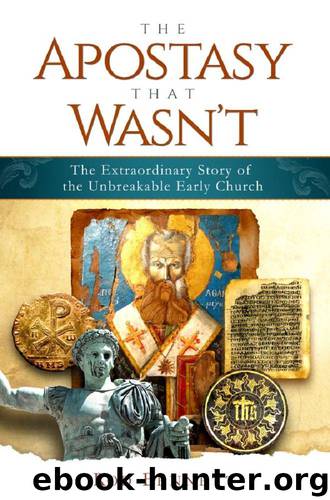The Apostasy That Wasn't: The Extraordinary Story of the Unbreakable Early Church by Bennett Rod

Author:Bennett, Rod [Bennett, Rod]
Language: eng
Format: mobi
Publisher: Catholic Answers Press
Published: 2015-09-16T16:00:00+00:00
7
Plantations of Tares
“Another parable put he forth unto them, saying, The kingdom of heaven is likened unto a man which sowed good seed in his field: But while men slept, his enemy came and sowed tares among the wheat, and went his way. But when the blade was sprung up, and brought forth fruit, then appeared the tares also” (Matt. 13:24–26 KJV).
How had it happened? How had Arianism gone, over the course of some twelve to fifteen short years, from a fringe theory preached in one church by one wild-eyed presbyter to the roaring brushfire that had now pushed the “pope” of Alexandria himself into exile? Arianism, in fact, actually seemed to have been strengthened somehow by its initial defeat at Nicaea. Why? The simplest answer, perhaps, is that after the council, Arius suddenly found himself selling, almost by chance, exactly what a good portion of the Roman population happened to want at the moment. It had been the last thing on his mind, to be sure, but the Egyptian heresiarch had succeeded in perfecting a kind of “Christianity Lite,” a diet substitute—a way to accept Constantine’s great revolution without really accepting it, a method for being “Christian” without actually putting the Christians in charge. The poor deluded fellow himself (who died not long after Athanasius was sent to Treves) must have gone to his grave believing that the whole world had suddenly developed a burning interest in his woolly-headed Christology.200 But the truth is that Arius had built the world something else altogether, something it really was interested in: he’d made a fallback position in which to retreat, a refuge for the reluctant.
Nicaea had been quite the spectacle to pagan observers. Many of them must have felt that the council “got away” from Constantine. Here, after all, was an emperor who began by threatening the bishops in the good old Roman style, insisting on “peace” in their churches in the crudest, most political sense or consequences to follow. Yet by the end, Constantine had risen from his low stool to give Hosius, Alexander, and (the now-banished) Eustathius exactly what they had wanted from the beginning: his stamp on their leadership. So it must suddenly have felt, for the nonbeliever, as if your father had got mixed up in a cult somehow and started signing all his property over to the head gurus. Eusebius of Nicomedia had not been alone in suspecting Constantine of converting “for the greater good.” Probably most of the pagan population suspected this; and it was, in fact, even true in a certain sense—at least to begin with.
But his behavior since then had only grown more and more puzzling. Surely the emperor could see that if his plan was going to work, it depended greatly upon the Church’s ability to absorb almost everyone—or perhaps we should say its willingness to do it. That, after all, is what unity means. His nascent cult of solar monotheism had shown promise, from the pagan point of view, because it
Download
This site does not store any files on its server. We only index and link to content provided by other sites. Please contact the content providers to delete copyright contents if any and email us, we'll remove relevant links or contents immediately.
| Buddhism | Christianity |
| Ethnic & Tribal | General |
| Hinduism | Islam |
| Judaism | New Age, Mythology & Occult |
| Religion, Politics & State |
Cecilia; Or, Memoirs of an Heiress — Volume 1 by Fanny Burney(31326)
Cecilia; Or, Memoirs of an Heiress — Volume 3 by Fanny Burney(30929)
Cecilia; Or, Memoirs of an Heiress — Volume 2 by Fanny Burney(30886)
The Secret History by Donna Tartt(16611)
Sapiens: A Brief History of Humankind by Yuval Noah Harari(13040)
Leonardo da Vinci by Walter Isaacson(11897)
The Radium Girls by Kate Moore(10903)
Sapiens by Yuval Noah Harari(4531)
The Wind in My Hair by Masih Alinejad(4421)
How Democracies Die by Steven Levitsky & Daniel Ziblatt(4393)
Homo Deus: A Brief History of Tomorrow by Yuval Noah Harari(4273)
Endurance: Shackleton's Incredible Voyage by Alfred Lansing(3834)
The Silk Roads by Peter Frankopan(3752)
Man's Search for Meaning by Viktor Frankl(3623)
Millionaire: The Philanderer, Gambler, and Duelist Who Invented Modern Finance by Janet Gleeson(3566)
The Rape of Nanking by Iris Chang(3508)
Hitler in Los Angeles by Steven J. Ross(3431)
The Motorcycle Diaries by Ernesto Che Guevara(3325)
Joan of Arc by Mary Gordon(3254)
